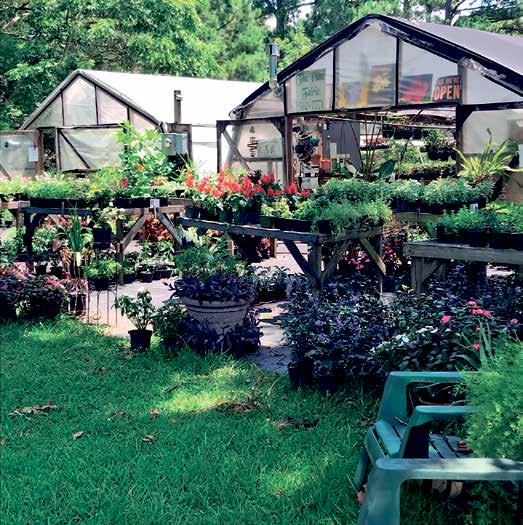
3 minute read
The psychological benefits of gardening
The psychological
benefits of gardening
Advertisement
BY TERRI LOFTIN
The Plant Fairie, Fairhope
Interacting with nature is essential to maintaining a sense of well-being. Through gardening and spending time around plants, individuals can reap a wide range of psychological benefits. Here are just a few mental health benefits of being around indoor plants and gardening.
1. Improves Mood
Human beings generally feel happier and more optimistic in surroundings with plenty of plants and nature. Consider a survey conducted at four San Francisco Bay Area hospitals. In the survey, 79 percent of patients said they felt more relaxed and calm, 19 percent felt more positive, and 25 percent felt refreshed and stronger after spending time in a garden.
Flowers also evoke positive emotions. For example, in a 2005 study, women who received flowers reported more positive moods three days later. Elderly patients who received flowers also reported brighter moods and improved episodic memory.
While you may only need to place a plant on the windowsill at home to help create a more soothing environment, you can increase happy feelings even more through gardening.
Gardening reminds us of our connection to nature, and helps us focus on the bigger picture, which can alleviate symptoms of depression. Also, the physical aspect of gardening releases feel-good chemicals in the brain such as serotonin and dopamine.
Finally, working with soil makes us happier. A 2007 study found a bacterium in soil called Mycobacterium vaccae triggers the release of serotonin, which lifts mood and reduces anxiety.
2. Relieves Stress and Anxiety.
Looking at plants and flowers, whether indoors or outdoors, is a peaceful activity free of worries or conflict. It encourages living in the present moment and engages the senses. When you take time to smell the sweet perfume of a magnolia tree, for example, your cortisol levels drop.
Consider a study published in the “Journal of Physiological Anthropology.” In this study, one group of participants worked on computer tasks, while

another group transplanted indoor plants. After completing their assignments, the groups switched.
The researchers found the subjects felt more comfortable and relaxed after the transplanting task, rather than the computer task. The study concluded individuals could reduce psychological and psychological stress by interacting with plants.
Another study, published in the “Journal of Health Psychology,” compared the effects of outdoor gardening to indoor reading. The study reveals both gardening and reading decrease cortisol levels.
However, stress levels decrease significantly more with gardening. Likewise, the study participants enjoyed a fully restored positive mood after gardening.
3. Prolongs Attention Span
Gardening and being around plants strengthen the attention span, which can aid concentration and learning.
For example, a study published in the “American Journal of Public Health” examines the impact of green or natural settings on children with attention deficit hyperactivity disorder (ADHD). Researchers found activities carried out in green settings significantly reduce symptoms of ADHD compared to other settings.
Many children can benefit from spending time in nature. According to the CDC, an estimated 6.1 million children in the U.S. have received an ADHD diagnosis.
Gardening also helps children to achieve academically.
A study published by the American Society for Horticultural Science demonstrates the impact of gardening activities as part of a science curriculum. Students who gardened scored significantly higher on a science achievement test than students who studied science in a traditional classroom setting.
Terri Loftin operates The Plant Fairie in Fairhope. You can visit her and learn more about the benefits of gardening at 21085 Jubilee Trail in Fairhope.








